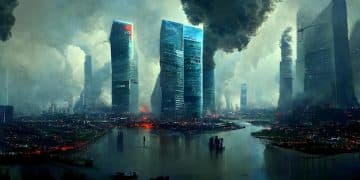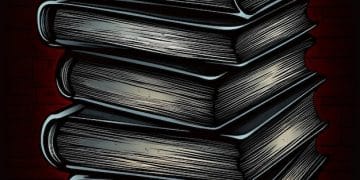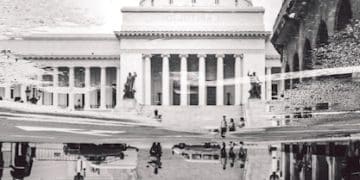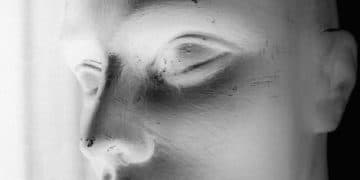Decoding Dystopian Novels: A Critical Analysis for US Society
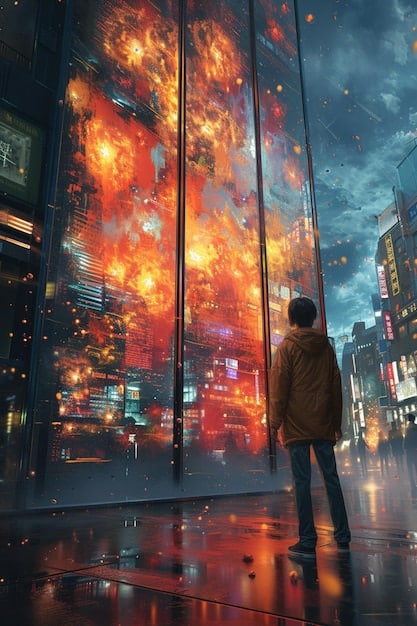
Dystopian novels reflect societal anxieties, and a critical analysis of three recent releases reveals how they decode contemporary US issues like technological surveillance, economic inequality, and political polarization, offering profound insights into present-day concerns and potential futures.
Recent dystopian literature offers more than just thrilling escapes into imagined futures; it provides a vital lens through which to examine the anxieties and complexities of our current world. In this critical analysis, we delve into decoding dystopian novels: a critical analysis of 3 recent releases and their relevance to current US society, exploring how these narratives reflect and critique pressing issues, from surveillance culture to social stratification, that are deeply embedded within the fabric of American life today.
The Enduring Allure of Dystopian Narratives
The genre of dystopian fiction, with its vivid portrayals of societies gone awry, has captivated readers for centuries. From early cautionary tales to modern blockbusters, these stories explore inherent human fears about unchecked power, technological overreach, and the loss of individual freedoms. Their continued popularity lies in their ability to reflect contemporary societal concerns, often amplifying them to an extreme degree to provoke thought and discussion. In the US, where debates about privacy, social justice, and governance are constant, dystopian novels resonate deeply. They act as speculative mirrors, reflecting present challenges and inviting us to consider alternative paths for our collective future.
Evolution of the Dystopian Trope
Dystopian fiction has evolved significantly, moving beyond simple totalitarian regimes to encompass more nuanced threats. Early works often focused on state control and political oppression. Modern dystopias, however, frequently explore environmental collapse, corporate dominance, or the insidious nature of pervasive technology. This shift mirrors the changing anxieties of society, as global challenges replace more localized fears. The genre now grapples with complex ethical dilemmas, pushing readers to question the promises of progress and the true cost of convenience.
- Early Dystopias: Emphasized government control and individual suppression (e.g., 1984, Brave New World).
- Mid-Century Dystopias: Introduced elements of environmental degradation and Cold War anxieties.
- Contemporary Dystopias: Focus on technological surveillance, AI, climate change, and hyper-capitalism.
Contemporary dystopian novels are particularly adept at dissecting the subtle mechanisms of control. They highlight how societal structures, rather than overt tyranny, can erode personal autonomy and exacerbate inequalities. By examining these intricate systems, authors challenge readers to look beyond superficial appearances and understand the deeper forces shaping their lives.
Case Study 1: “The Archive of Souls” by Kaelen Blackwood
Kaelen Blackwood’s “The Archive of Souls” plunges readers into a future America where all personal memories are systematically uploaded, categorized, and stored in a vast digital archive. This government-mandated “Soul Archive” is ostensibly designed to preserve human experience and aid in psychological well-being, but its true purpose—and the dangers it poses—slowly unravels. The novel expertly explores themes of privacy, identity, and the weaponization of personal data, echoing current US debates surrounding big tech, data breaches, and the commodification of individual lives. Blackwood’s narrative forces us to confront the ethical implications of a fully digitized existence, where even the most intimate aspects of self are not truly our own.
The protagonist, a reluctant archivist named Elara, discovers discrepancies in the official records, leading her down a rabbit hole of suppressed truths and forgotten histories. Her journey highlights the fragility of individual narratives when controlled by an external power structure. The novel suggests that true freedom might lie not in endless access to information, but in the power to selectively forget and create one’s own meaning. This deeply resonates with a society grappling with information overload and the persistent digital footprint.
Memory, Data, and Control
The concept of a centralized memory archive is a speculative extreme, yet it grounds itself in our present reality where digital platforms store vast amounts of personal information. The novel raises critical questions about data ownership and the potential for manipulation when such sensitive data is concentrated.
- Data Privacy: Explores the dangers of centralized digital archives and government access to personal memories.
- Identity Erosion: How constant access and manipulation of memories can redefine or destroy individual identity.
- Technological Ethics: Challenges readers to consider the moral boundaries of advanced technologies designed to “improve” human life.
Blackwood effectively illustrates how the pursuit of societal perfection through technological means can inadvertently lead to profound dehumanization. The brilliance of “The Archive of Souls” lies in its ability to take a familiar contemporary concern—our reliance on and vulnerability to digital systems—and extrapolate it to a chilling, yet believable, logical conclusion. The underlying message is clear: while technology offers immense potential for good, its unchecked evolution can pave the way for unprecedented forms of control and societal disruption, affecting who we are and what we remember.
Case Study 2: “The Last Harvest” by Elias Vance
Elias Vance’s “The Last Harvest” paints a grim picture of an America ravaged by climate change and economic disparity. In this near-future, resource scarcity has led to extreme social stratification, with a wealthy elite sheltered in ecologically preserved enclaves, while the vast majority struggle in polluted, arid “Wastelands.” The novel is a scathing critique of modern capitalism’s environmental toll and the widening gap between the rich and the poor in the US. Vance masterfully uses the metaphor of a decaying environment to illustrate the decay of social cohesion, showing how economic forces exacerbate ecological disaster and vice versa.
“The Last Harvest” follows a young woman named Anya, a scavenger from the Wastelands, who embarks on a perilous journey to reach one of the fabled Green Zones. Her odyssey is marked by encounters with desperate communities, corporate militias, and the stark reality of a world divided by privilege. The narrative is a powerful exploration of climate injustice, where those least responsible for environmental destruction bear its harshest consequences. Vance’s writing is visceral, making the reader feel the dust, hunger, and despair that permeate Anya’s world, drawing a direct line to current environmental crises and economic debates in the US.
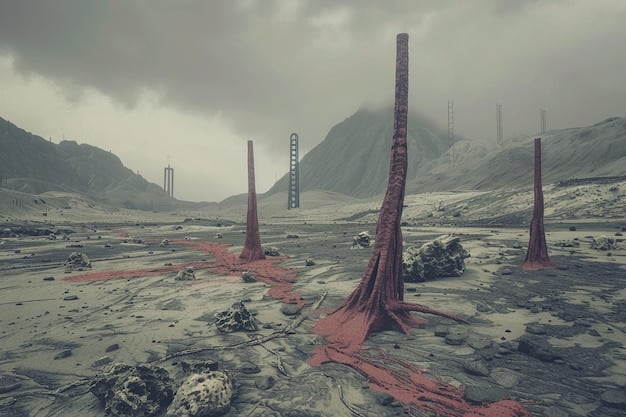
Climate Injustice and Economic Divide
The novel directly addresses the consequences of climate change on vulnerable populations, a topic of growing urgency in the US. It vividly portrays how wealth insulates the powerful from environmental harm, while the poor suffer disproportionately. This mirrors real-world discussions about environmental racism and economic inequality.
- Environmental Apartheid: The stark division between resource-rich and resource-depleted regions, mirroring global disparities.
- Corporate Exploitation: Powerful corporations controlling vital resources and dictating the terms of survival.
- Resilience in Adversity: The human spirit’s capacity for hope and resistance even in the direst circumstances.
Vance doesn’t shy away from depicting the moral compromises and brutal realities that arise when resources dwindle. The desperate acts of survival and the small acts of kindness illuminate the complex human response to systemic collapse. The political undertones are undeniable, pushing readers to consider the long-term impacts of policy decisions on both the environment and social equity. “The Last Harvest” serves as a stark reminder that the future is not a predetermined destination, but rather a consequence of present choices regarding sustainability and social justice.
Case Study 3: “The Divided States of America” by Jonah Beckett
Jonah Beckett’s “The Divided States of America” presents a chilling vision of a nation fractured not by civil war, but by ideological incompatibility. In this speculative future, the US has devolved into autonomous regions, each governed by a hyper-specific and often extreme interpretation of core American values. The novel provides a sharp critique of political polarization, echo chambers, and the erosion of shared national identity, themes highly relevant to the current socio-political landscape of the US. Beckett explores what happens when common ground becomes non-existent and differing worldviews become mutually exclusive, offering a cautionary tale about extreme tribalism.
The story follows a disillusioned historian, Dr. Aris Thorne, who attempts to cross the borders between these “States,” hoping to find common threads that once united the nation. His journey reveals the absurdity and tragedy of societies built on unwavering dogma, where communication across ideological lines is not just difficult, but actively discouraged. Beckett’s prose is sharp and introspective, analyzing the psychological toll of living in a perpetually divided society. The different “States” represent exaggerated forms of contemporary political factions, from extreme libertarian enclaves to hyper-regulated communal zones, each convinced of its own righteousness.
Political Polarization and Echo Chambers
This novel directly addresses the contemporary phenomenon of political polarization in the US. It explores the dangerous consequences of communities retreating into ideologically homogeneous spaces, where dissenting opinions are silenced or demonized.
- Fragmented Identity: How ideological divides can lead to a loss of collective national identity.
- Information Control: The manipulation of news and information within each “State” to reinforce partisan beliefs.
- The Search for Unity: The protagonist’s desperate attempt to bridge divides and find common humanity.
Beckett expertly illustrates how the lack of diverse perspectives can lead to societal stagnation and mutual distrust. The characters struggle with the consequences of inherited divisions, often longing for connection while being bound by the strictures of their respective “States.” “The Divided States of America” is a powerful and timely commentary on the fragility of democracy when political discourse descends into unyielding animosity, ultimately suggesting that true strength lies in our ability to engage with, rather than insulate ourselves from, differing viewpoints. This novel is not just a warning but a call for introspection on the state of American unity.
Common Threads and Contemporary Relevance
Examining “The Archive of Souls,” “The Last Harvest,” and “The Divided States of America” reveals a striking commonality: these novels are not merely futurist fantasies but amplified reflections of present-day concerns within US society. While each tackles distinct issues—data privacy, climate injustice, and political polarization, respectively—they all converge on the theme of a fracturing society, often due to unchecked power, whether technological, economic, or ideological. The anxieties they portray are deeply rooted in current events, serving as stark warnings about the potential consequences of continuing on our present trajectory. Their relevance transcends entertainment, making them crucial tools for understanding and discussing complex social dilemmas.
These narratives highlight how individual agency is threatened when societal structures become too overwhelming or when communities fail to find common ground. They explore the insidious ways control can be exerted, not always by overt force, but through algorithms, economic desperation, or the manipulation of truth. This makes them particularly poignant for an American audience navigating an era of rapid technological change, profound social inequalities, and entrenched political divisions. They invite us to question the narratives we are told, and to actively shape the future rather than passively accept it.

Urgent Warnings for US Society
The novels collectively paint a picture of a society at a crossroads, urging readers to consider the long-term implications of current trends. They serve as a powerful literary platform for discussing critical issues that often feel too abstract or overwhelming in daily news cycles.
- Erosion of Trust: How unchecked power and polarization lead to deep-seated societal distrust.
- Individual Agency: The ongoing struggle to maintain personal autonomy in increasingly complex systems.
- Call to Action: Implicitly encouraging readers to engage with societal challenges before they escalate.
The power of these dystopian narratives lies not just in their ability to scare or entertain, but in their capacity to foster critical thinking about the world we inhabit. By presenting extreme versions of our present, they compel us to recognize the subtle, everyday manifestations of these problems and encourage us to seek solutions. These authors, through their imaginative storytelling, effectively act as societal watchdogs, offering invaluable perspectives on the trajectory of American society and the universal struggles for freedom, equity, and truth.
The Role of Dystopian Literature in Social Commentary
Dystopian literature has always served as a potent form of social commentary, but its role in the contemporary US context feels particularly urgent. By exaggerating current trends and anxieties, these novels provide a safe space for readers to explore complex and often uncomfortable truths without the immediate pressure of real-world politics. They allow us to imagine worst-case scenarios, not to induce despair, but to understand the mechanisms that could lead us there and, crucially, to identify what we can do to prevent them. This genre offers a unique educational opportunity, fostering empathy and critical thinking about systemic issues.
These books are more than just stories; they are cultural artifacts that reflect the collective consciousness of a society wrestling with its future. They stimulate dialogue, encourage civic engagement, and can even inspire direct action. In a world saturated with information, often presented in fragmented and biased ways, dystopian novels offer coherent, if fictionalized, narratives that reveal deeper patterns and connections in our social and political fabric. They remind us that the future is not fixed, but a dynamic canvas influenced by present choices.
Beyond Entertainment: A Tool for Change
The impact of dystopian fiction extends far beyond mere entertainment. It functions as a mirror, a warning, and even a guide, equipping readers with new perspectives to navigate an increasingly complex world.
- Fostering Empathy: Allowing readers to experience consequences of societal dysfunction vicariously.
- Inspiring Advocacy: Motivating readers to become more involved in addressing social and political issues.
- Critical Engagement: Encouraging a deeper analysis of power structures and their impact on daily life.
Through vivid characters and immersive worlds, dystopian authors shine a spotlight on the potential costs of societal complacency or misguided progress. They remind us that the utopian promise can quickly turn dystopian if fundamental human rights and ecological balances are ignored. For US society, these recent releases are particularly timely, offering nuanced interpretations of how contemporary challenges could shape our tomorrow. They stand as powerful testaments to the enduring relevance of storytelling as a means of truth-telling and social critique, pushing us to critically analyze our present and actively strive for a better future.
Navigating the Future: Lessons from Dystopian Visions
The insights offered by “The Archive of Souls,” “The Last Harvest,” and “The Divided States of America” are not to be taken as prophecies, but as intellectual exercises designed to illuminate potential futures based on current trajectories. Their collective message is one of vigilance: that societies must actively safeguard individual liberties, address environmental and economic disparities, and foster constructive dialogue across ideological divides. Ignoring these warnings risks sleepwalking into futures where human agency is diminished, resources are scarce for the many, and unity is a forgotten dream. The lessons gleaned from these dystopian visions are therefore profoundly practical, urging a reevaluation of our shared values and collective responsibilities.
Understanding these narratives helps us to critically assess the innovations and policies of today. When faced with new technologies that promise efficiency but demand personal data, or economic policies that generate wealth but widen inequalities, these books provide a framework for asking crucial questions about long-term societal impact. They encourage us to look beyond immediate benefits and consider who truly gains and who truly loses in the grand scheme of societal progress. The future is not a passive event that happens to us; it is actively shaped by the decisions made today by individuals, communities, and governments.
Empowering Informed Decision-Making
These novels empower readers to be more informed citizens, capable of discerning the complex interplay of forces shaping their world. They offer unique perspectives that can influence public discourse and advocacy efforts.
- Proactive Engagement: Understanding potential consequences to prevent undesirable outcomes.
- Ethical Reflection: Contemplating the moral implications of technological and social advancements.
- Societal Resilience: Building stronger, more equitable communities to withstand future challenges.
Ultimately, decoding dystopian novels isn’t just about analyzing fiction; it’s about interpreting the anxieties and hopes of real-world societies struggling with profound change. For US society, these three recent releases offer a compelling, albeit unsettling, blueprint of what could be, and a powerful call to action for what should be. They remind us that the power to alter the course of our future resides within our collective wisdom and our commitment to justice, freedom, and human connection. The future is unwritten, but these books serve as valuable signposts along the path.
| Key Novel Insights | Brief Description |
|---|---|
| 💾 “The Archive of Souls” | Explores dangers of pervasive data, memory manipulation, and identity erosion in a surveillance state. |
| 🌍 “The Last Harvest” | Critiques climate injustice, economic inequality, and environmental degradation’s social impact. |
| 🇺🇸 “The Divided States of America” | Analyzes extreme political polarization, echo chambers, and the fragmentation of national identity. |
| 💡 Common Relevance | These novels reflect US societal anxieties about unchecked power, systemic inequality, and social fragmentation. |
Frequently Asked Questions About Dystopian Novels
Dystopian novels resonate deeply in the US due to their ability to mirror current societal anxieties regarding technological advancements, political divides, and socioeconomic inequalities. They offer a safe space to explore and process fears about the future, engaging readers in critical thought about pressing contemporary issues. This genre provides a predictive lens, reflecting our collective hopes and anxieties.
While classics often focused on overt totalitarianism and state control, recent dystopian novels delve into more insidious forms of control. They frequently explore threats from big data, corporate power, climate change, and hyper-polarization rather than just government oppression. This shift reflects a more nuanced understanding of how freedom and society can be undermined in modern contexts.
Yes, dystopian literature can significantly influence real-world societal change by fostering critical thinking and empathy. By presenting exaggerated but plausible futures, these novels provoke readers to question existing power dynamics and inspire discussions about ethical responsibilities. They often serve as cautionary tales that can galvanize advocacy and inspire individuals to challenge detrimental social or technological trends.
These novels collectively highlight critical facets of contemporary US society: “The Archive of Souls” warns about data privacy and identity in a hyper-digital world; “The Last Harvest” critiques climatic injustice and economic disparity; and “The Divided States of America” addresses political fragmentation and echo chambers. Each offers a unique, yet interconnected, commentary on modern American challenges.
Readers can engage more deeply by discussing the books in clubs, writing reviews that connect themes to current events, and researching the real-world issues discussed. Participating in online forums, attending author talks, or even supporting organizations working on related social causes can further enrich the experience. Applying fictional warnings to real-life observations is key.
Conclusion: A Call for Critical Engagement
The act of decoding dystopian novels: a critical analysis of 3 recent releases and their relevance to current US society reveals more than just gripping stories; it offers profound insights into the anxieties and potential futures of our nation. “The Archive of Souls,” “The Last Harvest,” and “The Divided States of America” are powerful literary tools that underscore the importance of addressing technological oversight, environmental justice, and political polarization. These books challenge us to look beyond the page, fostering a critical engagement with the world around us. By understanding their warnings, we are better equipped to navigate the complexities of our present and actively shape a more equitable and resilient future for all.
